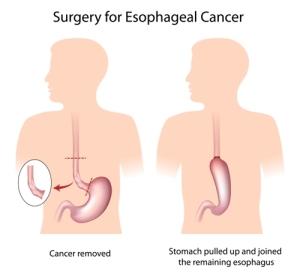Treatment of esophageal cancer depends on accurate diagnosing of the stage the cancer is in, so that appropriate treatment can be started. The problem in researching evidence based medicine data regarding the optimal treatment is that the literature is very confusing.
For instance, we know from large series (for instance a study with about 700 patients from Massachusetts Gen. Hosp., cited on p.783, Ref. 1) that esophageal cancer occurs in about 25% of patients in the upper third, in 50% in the middle third and in 25% in the lower third of the esophagus.
Most of the literature, however, does not cite the exact location of the cancer and therefore we only get general survival data. There are similar problems with cancer staging as some authors are very precise, even citing the TNM system on top of the stage I to IV nomenclature, but others only report about a “group that was seen in their clinic”.
Most patients already have systemic disease and the challenge in future is to improve on the cancer survival rate with newer combination therapies. With esophageal cancer we are not at this point yet. However, there are trials going on to improve on survival and I will report about some of this progress.
Surgery has been very successful for stage I esophageal cancer when the cancer is confined to the mucosal lining and does not exceed 5 cm (=2″) of local spread. Techniques for this vary, but two standard approaches are the trans-thoracic approach, where the surgery is done through the opened chest cage, and the trans-hiatal approach, where surgery is done through the abdominal cavity from below. A common approach is the removal of the esophagus (called “esophagectomy”) and replacement of it by the left half of the transverse colon. The mortality rate of this procedure in the hands of an experienced cancer surgeon is about 7%.
Here are the 5-year survival rates with surgery alone or with additional radiation therapy or chemotherapy for more advanced stages regarding esophageal cancer:
5-year survival rates for esophageal cancer
| Stage | with surgery | additional therapy followed by surgery |
| I | 70.5 % | |
| II | 24.5 % | 45 % * |
| III | 12.5 % | 33 % ** |
| IV | 0 % | 5- 10 % * |
| * radiation therapy followed by extensive tumor load reducing surgery |
| ** chemotherapy and radiation therapy followed by surgery |
There seems to be a consensus that for stage I esophageal cancer surgery alone would be the treatment of choice, although better survival rates may still be achieved with with additional radiotherapy or chemotherapy. No clinical trials, however, have been done to prove this. With stage II esophageal cancer, as can be seen from the above table, the results are better by about 20 % if radiation therapy is given first followed by surgery ( 24.5 % versus 45 % ).
Similarly, with grade III esophageal cancer where the cancer has invaded the surrounding structures and metastasized into the regional lymph glands, the 5-year survivals are superior with initial chemotherapy and radiotherapy followed by surgery. In this group of patients there was an improvement noticed from 12.5% to 33%. With stage IV the problem is that the immune system is paralyzed from the cancer and the patients are so weak and often in poor physical shape that they do not tolerate the toxic treatments like radiotherapy or chemotherapy. Surgery also has a much higher mortality rate meaning that most patients are inoperable.
References:
1. Cancer: Principles &Practice of Oncology.4th edition. Edited by Vincent T. DeVita, Jr. et al. Lippincott, Philadelphia,PA, 1993. Chapter 25. Cancer of the esophagus.
2. Cancer: Principles&Practice of Oncology. 5th edition, volume 1. Edited by Vincent T. DeVita, Jr. et al. Lippincott-Raven Publ., Philadelphia,PA, 1997. Cancer of the esophagus.
3. D Sharma J Indian Med Assoc 1999 Sep;97(9): 360-364.
4. MJ Roth et al. Cancer Res 2001 May 15;61(10):4098-4104.
5. K Schumacher et al. Cancer Res 2001 May 15;61(10):3932-3936.
6. M Tachibana et al. Virchows Arch 2001 Apr;438(4):350-356.
7. SJ Spechler et al. JAMA 2001 May 9;285(18):2331-2338.
8. Suzanne Somers: “Breakthrough” Eight Steps to Wellness– Life-altering Secrets from Today’s Cutting-edge Doctors”, Crown Publishers, 2008







